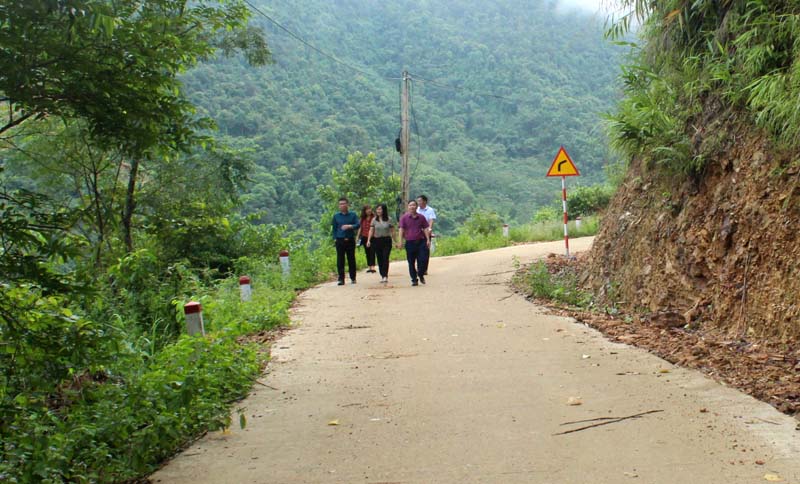
(HBO) – Da Bac district, spanning 77,976 hectares of land, has 20 communes and town covered by Programme 135 – programme for socio-economic development in specially-disadvantaged communes in ethnic minority and mountainous areas.
 Thanks to investment from Programme 135, roads in Sung
hamlet (Cao Son commune) were concretised, helping the hamlet develop
community-based tourism.
Thanks to investment from Programme 135, roads in Sung
hamlet (Cao Son commune) were concretised, helping the hamlet develop
community-based tourism.
Vice Chairwoman of the district People’s Committee Bui Thi Hieu said the
district has made poverty alleviation a key mission, which is inseparable from
the local socio-economic development strategy.
The spirit of self-reliance should be promoted among impoverished households so
as to realise the sustainable poverty reduction target, she added.
In the past time, the national target programme on sustainable poverty
reduction has served as a lever for the district’s socio-economic development.
Programme 30A, which is designed to support 64 poorest district across the
country to rapidly reduce poverty through investment in essential
infrastructure system, has given a facelift to Da Bac district. New infrastructure
facilities have been built and existing ones repaired and upgraded; poverty
alleviation models have been set up to improve and diversify local livelihoods.
Under the programme, many labourers from poor, near poor and ethnic families
have chances to work abroad.
Particularly, Programme 135 helped the district build 33 public works, maintain
52 others, support 28 production models, and open training class to transfer
science and technology in 2018.
This year, Da Bac district received 20.48 billion VND from the programme to
upgrade and build local infrastructure.
Along with the programmes, the district People’s Committee has pushed forward
with the preferential credit policy for households living under and just above
the poverty line, and those who have just escaped poverty.
The sustainable poverty reduction programmes have promoted socio-economy in Da
Bac district, resulting in the fall in the poverty and unemployment rates.
Last year, poor households accounted for 37.04 percent of the district’s total
families. The rate is projected to drop to 32 percent in 2019./.
Mai Chau district has firmly established itself as a standout destination on Vietnam’s tourism map, attracting both domestic and international visitors with its breathtaking landscapes, rich ethnic culture, and warm hospitality. However, beyond its natural and cultural charm, a secure and well-managed tourism environment has added to Mai Chau’s appeal.
As Vietnam enters a new phase of economic and administrative reform in 2025, Hoa Binh province is stepping up its efforts to streamline governance, boost economic growth, and attract investment.
The Hoa Binh provincial People's Committee held its monthly meeting on March 26 to review the progress of key projects, assess budget revenue and public investment disbursement, provide feedback on draft documents for submission to the provincial Party Committee's Standing Board, and discuss other important matters related to the committee's governance activities.
Playing a key role in Hoa Binh province’s economic development, Luong Son district has been focusing on science and technology development, innovation, and digital transformation.
Identifying the application of online public services as a key step in administrative procedure reform and e-government building, Kim Boi district has proactively provided services and supported residents and businesses in accessing and utilising full-process online public services promptly and efficiently. The locality aims to lift the rate of end-to-end online public services to over 90%, with all officials and civil servants handling tasks in the digital environment.
Nguyen Anh Tuyet, hailing from a family steeped in the ancient art of herbal medicine, is transforming local medicinal herbs into high-value concentrated extracts, elevating their worth and healing potential.



 Thanks to investment from Programme 135, roads in Sung
hamlet (Cao Son commune) were concretised, helping the hamlet develop
community-based tourism.
Thanks to investment from Programme 135, roads in Sung
hamlet (Cao Son commune) were concretised, helping the hamlet develop
community-based tourism.